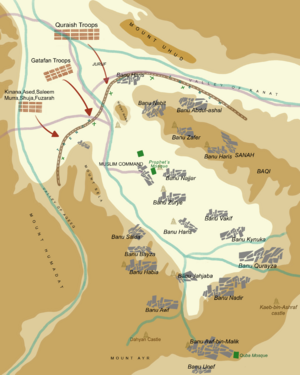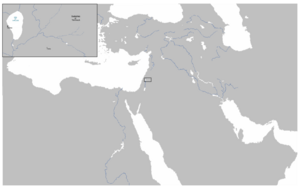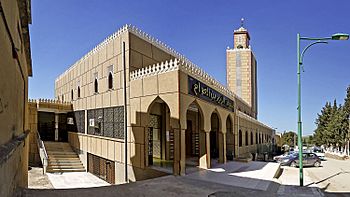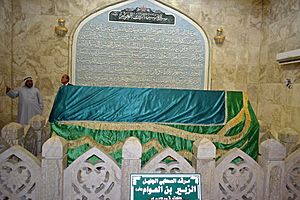Zubayr ibn al-Awwam facts for kids
Quick facts for kids
Zubayr ibn al-Awwam
زبير ابن العوام |
|
|---|---|
| Native name |
Arabic: زبير ابن العوام
|
| Other name(s) | Hawari Rasul Allah ('Disciple of Messenger of God') Abu Abd Allah |
| Born | c. 594 Mecca, Hejaz, Arabia |
| Died | c. 656 (aged 61–62) Basra, Rashidun Caliphate (present-day Iraq) |
| Buried |
Mazar Zubayr, Zubayriyya, Iraq
|
| Allegiance | Rashidun Caliphate |
| Service/ |
|
| Years of service | 636, 640–642 |
| Rank | Amir al Jaysh (Field commander of the caliphate army) |
| Commands held |
|
| Battles/wars |
|
| Spouse(s) |
|
| Children |
|
| Relations | Awwam ibn Khuwaylid (father) Safiyya bint Abd al-Muttalib (mother) |
| Other work |
|
Zubayr ibn al-Awwam (594–656) was an important Arab Muslim leader. He served the Islamic prophet Muhammad and later the first two caliphs, Abu Bakr and Umar. A caliph was a leader of the Muslim community.
Zubayr played a big role in the Ridda Wars (wars against rebel tribes) from 632 to 633. He also helped in the early Muslim conquests. These conquests included lands in Sasanian Iraq, Byzantine Syria, and parts of Africa.
Zubayr was one of the first people to become a Muslim. Muhammad made him a commander in the Battle of Badr in 624. Zubayr helped defeat the enemy forces in this battle. He fought in almost all of Muhammad's early battles. In the Battle of the Trench, Muhammad called him Hawari Rasul Allah, meaning 'Disciple of Messenger of God'.
After Muhammad passed away, Zubayr became a commander in the Ridda Wars. He helped defend Medina and fought in the Battle of Yamama. During Umar's time as caliph, Zubayr helped conquer lands in Egypt, the Levant (Syria), Persia, Sudan, and Tripolitania.
After Umar was killed, Zubayr became an important political figure. He was a chief advisor in the Shura, a council that chose the next caliph, Uthman. Zubayr advised Uthman on many issues. When Uthman was killed, Zubayr first supported the new caliph, Ali. However, he later withdrew his support because Ali did not immediately avenge Uthman's death. Zubayr's forces fought against Ali's forces in the Battle of the Camel in December 656. Zubayr was killed while praying after the battle.
Historians see Zubayr as one of the most skilled commanders in early Islam. Sunni Muslims believe he was one of the ten people promised Paradise. His descendants, known as the Zubayrids, live in many parts of the world today.
Contents
Early Life and Family
Zubayr's father was Al-Awwam ibn Khuwaylid. He was the brother of Khadija, Muhammad's first wife. Zubayr's mother was Safiyya bint Abd al-Muttalib, who was Muhammad's aunt. This made Zubayr Muhammad's first cousin.
Zubayr was born in Mecca in 594. He had two brothers and two sisters. His father died when Zubayr was young.
Becoming a Muslim
Zubayr became a Muslim when he was about 16 years old. He was one of the first few men to accept Islam. He was influenced by Abu Bakr, who later became the first caliph.
In 615, Zubayr was among the first Muslims to move to Abyssinia to escape persecution. While there, he bravely swam across the Nile River to check on the king, Najashi, during a rebellion. He returned to tell the Muslims that the king had won.
Zubayr was also one of the Muslims who moved to Medina in 622. This journey is known as the Hijra. In Medina, he became a successful merchant.
Military Achievements
Zubayr was a key commander in the Battle of Badr. This battle took place in 624. He played a big part in defeating the enemy. He also fought bravely in the Battle of Uhud. During this battle, he was one of the few who stayed with Muhammad when others fled. Muhammad praised him as the "Hawari" (disciple) for his courage.
After the Battle of Uhud, Zubayr helped chase the enemy forces. He also gained land from the invasion of Banu Nadir.
Battle of the Trench
During the Battle of the Trench, Zubayr fought a duel and defeated an enemy warrior. The Muslim fighters were impressed by his strength. Zubayr also spied on the Banu Qurayza tribe for Muhammad. Muhammad then said, "Every Prophet has a disciple, and my disciple is Al-Zubayr."
After this battle, Zubayr helped in the Invasion of Banu Qurayza. The Muslim army besieged the tribe's settlement. Zubayr and other soldiers broke through their defenses.
Pledge of the Tree
In 628 CE, Muhammad and his followers went to Mecca for a pilgrimage. The Quraysh tribe stopped them from entering. Muhammad sent Uthman ibn Affan to talk to them. When Uthman was delayed, Muhammad thought he had been killed.
Muhammad then gathered his followers. They made a promise to fight until death to avenge Uthman. This promise is called the Pledge of the Tree. The Qur'an praises those who made this pledge, including Zubayr.
Battle of Khaybar
In 628, Zubayr fought in the Battle of Khaybar. He defeated an enemy champion in a one-on-one fight. After the battle, Zubayr was one of the leaders who helped divide the spoils of war.
Conquest of Mecca
In December 629, Zubayr helped Muhammad prepare for the Conquest of Mecca. He helped bring back a letter from a spy. This helped Muhammad surprise the enemy. When Muhammad entered Mecca, Zubayr carried one of the main flags. He led the left side of the army.
Later, in the Battle of Hunayn in 630 CE, Zubayr led a counterattack. He helped drive the enemy out of the valley. Zubayr also took part in the Siege of Ta'if and the Expedition of Tabuk. Muhammad also appointed Zubayr to keep records of charity funds.
During the Caliphate
Ridda Wars
In 632, during the Ridda Wars, Zubayr helped defend Medina from rebel forces. He was a commander in the new elite guard unit. These units stopped the rebels from attacking Medina.
Zubayr also helped in the Expedition of Usama bin Zayd. This expedition was successful in raiding Byzantine territory. He also fought in the Battle of Yamama against a large rebel group.
Campaigns in the Levant and Persia
Zubayr helped conquer the city of Amman during the Muslim invasion of the Levant. He fought bravely against the Byzantines.
In 636, Zubayr fought in the Battle of the Yarmuk. He led his own group of soldiers. He charged alone against the enemy lines twice, even getting a serious shoulder injury. His brother, Abd al Rahman al-Zubayr, died in this battle. After the battle, Zubayr helped capture the city of Ayla (modern-day Aqaba). He also visited Jerusalem with Caliph Umar after it was taken.
Zubayr was part of the council that planned battles against the Persian army. He was sent to the Battle of Nahavand with other commanders. The Muslim army won a huge victory against the Sassanid army.
Campaigns in Africa
After the conquest of Jerusalem, Caliph Umar sent Zubayr to Egypt. He was part of a group of 4,000 soldiers sent to help Amr ibn al-As. Zubayr helped capture the city of Faiyum. He also helped besiege the Byzantine fortress at Heliopolis.
During the Siege of Babylon Fortress, Zubayr bravely climbed the fortress walls. He then opened the gates for the Muslim army. This led to the surrender of the city.
In 639, Zubayr helped conquer the city of Oxyrhynchus (al-Bahnasa). He fought against elephant corps and led a night raid. The siege lasted for months before the city fell.
Zubayr also helped conquer cities in Tripolitania, like Tripoli and Sabratha. He continued to conquer Sharwas in the Nafusa Mountains.
Later, Zubayr helped manage properties in Khaybar. He also became a member of the Majlis-ash-Shura, an advisory council. He helped elect the third caliph, Uthman.
In 644, Zubayr and his son, Abdullah, were sent to help in the Muslim conquest of North Africa. His son played a key role in defeating a large Byzantine army.
Later Life and Death
When Caliph Uthman was killed in 656, Zubayr hoped to be the next caliph. However, Ali was chosen. Zubayr, along with Muhammad's widow Aisha, called for justice for Uthman's death. Ali agreed but said he could not act immediately.
Zubayr, Aisha, and another companion, Talha, gathered an army. They marched to Basra and took control of the city. They wanted to punish those involved in Uthman's assassination.
Ali then arrived in Basra with his own army. There were talks between the two sides. However, fighting broke out on December 7, 656. This battle is known as the Battle of the Camel.
During the battle, Zubayr decided to leave the fight. He remembered that Muhammad had once told him he would fight Ali and be on the wrong side. As Zubayr was praying in a nearby field, a man named Amr ibn Jarmouz killed him.
Legacy
In Islamic Teachings
Islamic scholars see Zubayr as a very important figure. He is considered one of the highest-ranked companions of Muhammad. This is because Muhammad promised him Paradise during his lifetime. Scholars like Ibn Taymiyyah have praised Zubayr's strong faith.
Zubayr is especially honored for six key events:
- His move from Mecca to Medina (the Hegira).
- His bravery in the Battle of Badr.
- His courage in the Battle of Uhud.
- His role in the Battle of Hamra al-Asad.
- Receiving the title Hawari Rasulullah in the Battle of the Trench.
- His participation in the Pledge of the Tree.
Some Shia Muslims have a negative view of Zubayr because of his role in the Battle of the Camel.
Influence on Law and Ethics
Zubayr set some traditions for Islamic prayer and behavior. For example, he had a specific way of holding his fingers during prayer. He also taught about sitting while eating and drinking.
Many hadith (sayings and actions of Muhammad) are linked to Zubayr. He was careful about sharing hadith. He told his son, "Anyone who tells a lie about me should take a seat in the Fire."
Zubayr's ideas on Islamic law have influenced major schools of thought in Sunni Islam. These include the Shafi'i, Hanbali, Hanafi, and Zahiri schools.
In modern times, Zubayr's actions are still used as a guide. For example, his act of spying on the Banu Qurayza tribe is used to support government spying on enemies. In Egypt, many legal rulings are based on Zubayr's decisions from his time there.
Rules of War
Zubayr's actions in war have influenced how Muslims understand rules of war. This includes using military tricks, dividing war spoils, and treating prisoners.
Business and Charity
Zubayr was known for being very wealthy from his business. He often gave loans without charging interest. This practice became common in the Islamic world. He also owned many slaves and reportedly freed one every day.
Descendants
Zubayr's descendants are known as the Zubayrids. Many communities around the world, especially in Hejaz and Egypt, claim to be his descendants. The Zubairi community in India and Pakistan also claims him as an ancestor.
Personal Qualities
Zubayr was described as being of medium height, lean, and dark-skinned. He had a thin beard and long hair. Some reports say he was strong and tall. He had many battle scars on his body.
He owned many horses and had a large amount of property and wealth. However, he was known for being very generous.
Family Life
Zubayr married eight times and had twenty children.
- Asma bint Abi Bakr. They had eight children, including Abdullah and Urwa.
- Umm Kulthum bint Uqba. They had one daughter, Zaynab.
- Al-Halal bint Qays. They had one daughter, Khadija the Younger.
- Umm Khalid Ama bint Khalid. They had five children, including Khalid and Amr.
- Ar-Rabbab bint Unayf. They had three children, including Mus'ab and Hamza.
- Atiqa bint Zayd.
- Tumadir bint Al-Asbagh.
- Umm Ja'far Zaynab bint Marthad. They had two sons, Ubayda and Ja'far.
Zubayr named his sons after companions of Muhammad who died as martyrs. For example, he named his son Abdullah after Abd-Allah ibn Jahsh, who died in the Battle of Uhud.
Two of his most famous sons were Abdullah ibn al-Zubayr, who later claimed to be caliph, and Urwah ibn al-Zubayr, who was a famous scholar and writer.
One of Zubayr's daughters, Ramlah bint al-Zubayr, married an Umayyad prince. She was known for her great beauty.
Images for kids
-
Muhammad ibn al-Uthaymeen (far left), 19th century Salafi scholar and Saudi Permanent Committee of Fatwa member.
-
The Faisal Islamic Bank in Khartoum, Sudan.
See also
 In Spanish: Zubayr ibn al-Awam para niños
In Spanish: Zubayr ibn al-Awam para niños
- List of expeditions of Muhammad
- Sunni view of the Sahaba
- The ten to whom Paradise was promised
- List of Sahabah
- First Fitna
External online biography
- Ibrahim Habib, Jamil (1985) (in ar). Sīrat al-Zubayr ibn al-ʻAwwām wa-mawāqifuhu min maʻārik al-taḥrīr wa-al-futūḥāt al-ʻArabīyah al-Islāmīyah. al-Dār al-ʻArabīyah lil-Mawsūʻāt. https://www.google.co.id/books/edition/S%C4%ABrat_al_Zubayr_ibn_al_%CA%BBAww%C4%81m_wa_maw/VaMzAAAAIAAJ?hl=en&gbpv=0&bsq=%DA%A9%D8%A7%D9%86%20%D9%87%D9%86%D8%A7%D9%83%20%D8%A3%D9%8A%20%D9%88%D8%A7%D9%84%D8%AD%D8%B1%D8%A8%D9%8A%20%D9%88%D8%AA%D8%A3%D8%AB%D9%8A%D8%B1%D9%87%20%D8%B9%D9%84%D9%89%20%D8%AF%D9%81%D8%B9.
- Bin Ahmed Alrabiah, Saad (2003–2004) (in ar) (PDF). رحلة الحج من بلد الزبير بن العوام الى البلد الحرام (Riḥlat al-Ḥajj min balad al-Zubayr ibn al-ʻAwwām ilá al-balad al-ḥarām). Riyadh, Saudi: Dār al-Malik ʻAbd al-ʻAzīz. OCLC 61227859. https://www.worldcat.org/title/rihlat-al-hajj-min-balad-al-zubayr-ibn-al-awwam-ila-al-balad-al-haram/oclc/61227859.
- Abdur Rahim, Sabr (1978) (in ar). الزبير بن العوام. Saudi Arabia: King Abdul Aziz Public Library, DDC classification: 953,02. http://library.kapl.org.sa/cgi-bin/koha/opac-detail.pl?biblionumber=117300&query_desc=.
- Aḥmad ʻAbd al-Jawād Dūmī; Ḥasan Ṣāliḥ ʻInānī (1973) (in ar). الزبير بن العوام-- / al-Zubayr ibn al-ʻAwwām-- (Zubayr ibn al-ʻAwwām, -- -656 or 657. Muslims -- Saudi Arabia -- Biography. Muslims.). Beirut: al-Maktabah al-ʻAṣrīyah. OCLC 28879327. https://www.worldcat.org/title/zubayr-ibn-al-awwam/oclc/28879327&referer.
- ʻAṭīyah ʻAbd al-Raḥīm ʻAṭīyah (1977) (in ar). الزبير بن العوام / al-Zubayr ibn al-ʻAwwām (Zubayr ibn al-ʻAwwām, -- -656 or 657.). Majlis al-Aʻlá lil-Shuʼūn al-Islāmīyah. OCLC 122722789. https://www.worldcat.org/title/zubayr-ibn-al-awwam/oclc/122722789&referer=.
- Abd al-Jalīl Ḥammād; Kamāl ʻAbduh; Aḥmad Ṣābir (1997) (in ar). الزبير بن العوام / al-Zubayr ibn al-ʻAwwām (Zubayr ibn al-ʻAwwām, -- -656 or 657 -- Juvenile literature. Muḥammad, -- Prophet, -- -632 -- Companions -- Juvenile literature. Muḥammad, -- Prophet, -- -632 -- Family -- Juvenile literature.). Sharikah al-ʻArabīyah lil-Nashr wa-al-Tawzīʻ. OCLC 68707293. https://www.worldcat.org/title/zubayr-ibn-al-awwam/oclc/68707293&referer=.
- ʻAbd al-Raḥmān Shakūrī (2003) (in ar). زندگينامۀ حضرت زبير (رض) / Zindagīnāmah-ʼi Ḥaz̤rat Zubayr (raz̤) (Zubayr ibn al-ʻAwwām, -- -656 or 657. Muḥammad, -- Prophet, -- -632 -- Companions -- Biography. Muḥammad, -- Prophet, -- -632.). Turbat-i Jām : Shaykh al-Islām Aḥmad Jām. OCLC 150243526. https://www.worldcat.org/title/zindaginamah-i-hazrat-zubayr-raz/oclc/150243526&referer=.
- Muhammad Kamal; Badr al-Din Hadiri (1995) (in ar). الزبير بن العوام / (Zubayr ibn al-ʻAwwām, -- -656 or 657. Arabic language -- Readers. Battles -- Islamic Empire -- Juvenile literature.). Dar Rabi'. OCLC 28879327. https://www.worldcat.org/title/zubayr-ibn-al-awwam/oclc/28879327&referer.
- Zuberi Clan History – 2009 archive
- Talha and Zubair – 2011 archive
Khalid Basalamah
 | Anna J. Cooper |
 | Mary McLeod Bethune |
 | Lillie Mae Bradford |











